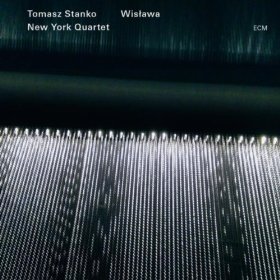
I’ve loved Tomasz Stańko’s music since the first time I heard him play, back in the early-1990s. And for once it was hearing the music live before listening to any of the records. That dramatically changes your perception of an artist, doesn’t it? Substantially more than even seeing a video. Actually seeing a video, despite the curiosity value, is pretty worthless unless it’s a fully blown artistic interpretation of the music, and sadly that doesn’t happen very often.
You go away with so much more information by seeing someone live, how the artist moves and interacts; how they carry themselves; all the non-verbal communicative signs; the way they speak if they speak. It’s still only a small part of the live experience. Stańko has assembled a new band called the New York Quartet for his latest studio album Wisława (**** RECOMMENDED), a double album to be released by ECM on Monday.
There are no UK dates for him so far, but he and the quartet, a band as skilled and intuitive as Stańko’s quartet with the Marcin Wasilewski trio, are appearing at the significant ECM cultural archaeology exhibition next month in Munich, and he will play Warsaw soon again before touring in Poland in May. Stańko’s band is Reflex pianist David Virelles, also playing prepared piano and celeste on Chris Potter’s new album The Sirens; Californian bassist Thomas Morgan now living in Harlem; and the drummer the avant garde cognoscenti adore, the Brooklyn-based drummer Gerald Cleaver who played a great set at the Vortex just last year with Lotte Anker and Craig Taborn.
Recorded in June not long after a brief tour in Europe the theme of the album ties in with the poetry of the great Wisława Szymborska, hence its title: Wisława. Stańko performed with the Nobel laureate late in her life, and a number of the album’s compositions are inspired directly by her work. And they are sublime, particularly the title track ballad and ‘Mikrokosmos’. Stańko can stop you dead in your tracks with the honesty and emotion of his playing, the blues connotation, and the sheer abstraction of it all. Wisława is this and much more, his best album since Leosia and a potent reminder of the artistry of the man. SG